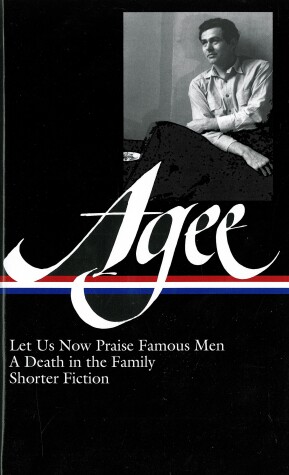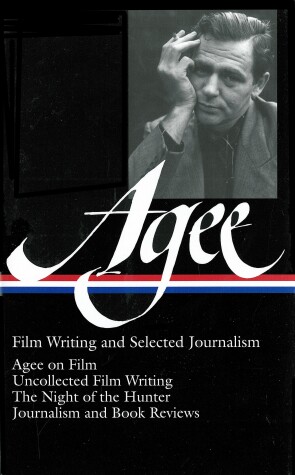Library of America James Agee Edition
2 primary works
Book 1
James Agee: Let Us Now Praise Famous Men / A Death in the Family / shorter fiction (LOA #159)
by James Agee
Published 22 September 2005
A passionate literary innovator, eloquent in language and uncompromising in his social observation and his pursuit of emotional truth, James Agee (1909–1955) excelled as novelist, critic, journalist, and screenwriter. In his brief, often turbulent life, he left enduring evidence of his unwavering intensity, observant eye, and sometimes savage wit.
This Library of America volume collects his fiction along with his extraordinary experiment in what might be called prophetic journalism, Let Us Now Praise Famous Men (1941), a collaboration with photographer Walker Evans that began as an assignment from Fortune magazine to report on the lives of Alabama sharecroppers, and that expanded into a vast and unique mix of reporting, poetic meditation, and anguished self-revelation that Agee described as “an effort in human actuality.” A sixty-four-page photo insert reproduces Evans’s now-iconic photographs from the expanded 1960 edition.
A Death in the Family, the Pulitzer Prize–winning novel that he worked on for over a decade and that was published posthumously in 1957, recreates in stunningly evocative prose Agee’s childhood in Knoxville, Tennessee, and the upheaval his family experienced after his father’s death in a car accident when Agee was six years old. A whole world, with its sensory vividness and social constraints, comes to life in this child’s-eye view of a few catastrophic days. It is presented here for the first time in a text with corrections based on Agee’s manuscripts at the Harry Ransom Humanities Research Center.
This volume also includes The Morning Watch (1951), an autobiographical novella that reflects Agee’s deep involvement with religious questions, and three short stories: “Death in the Desert,” “They That Sow in Sorrow Shall Not Reap,” and the remarkable allegory “A Mother’s Tale.”
LIBRARY OF AMERICA is an independent nonprofit cultural organization founded in 1979 to preserve our nation’s literary heritage by publishing, and keeping permanently in print, America’s best and most significant writing. The Library of America series includes more than 300 volumes to date, authoritative editions that average 1,000 pages in length, feature cloth covers, sewn bindings, and ribbon markers, and are printed on premium acid-free paper that will last for centuries.
This Library of America volume collects his fiction along with his extraordinary experiment in what might be called prophetic journalism, Let Us Now Praise Famous Men (1941), a collaboration with photographer Walker Evans that began as an assignment from Fortune magazine to report on the lives of Alabama sharecroppers, and that expanded into a vast and unique mix of reporting, poetic meditation, and anguished self-revelation that Agee described as “an effort in human actuality.” A sixty-four-page photo insert reproduces Evans’s now-iconic photographs from the expanded 1960 edition.
A Death in the Family, the Pulitzer Prize–winning novel that he worked on for over a decade and that was published posthumously in 1957, recreates in stunningly evocative prose Agee’s childhood in Knoxville, Tennessee, and the upheaval his family experienced after his father’s death in a car accident when Agee was six years old. A whole world, with its sensory vividness and social constraints, comes to life in this child’s-eye view of a few catastrophic days. It is presented here for the first time in a text with corrections based on Agee’s manuscripts at the Harry Ransom Humanities Research Center.
This volume also includes The Morning Watch (1951), an autobiographical novella that reflects Agee’s deep involvement with religious questions, and three short stories: “Death in the Desert,” “They That Sow in Sorrow Shall Not Reap,” and the remarkable allegory “A Mother’s Tale.”
LIBRARY OF AMERICA is an independent nonprofit cultural organization founded in 1979 to preserve our nation’s literary heritage by publishing, and keeping permanently in print, America’s best and most significant writing. The Library of America series includes more than 300 volumes to date, authoritative editions that average 1,000 pages in length, feature cloth covers, sewn bindings, and ribbon markers, and are printed on premium acid-free paper that will last for centuries.
Book 2
James Agee: Film Writing and Selected Journalism (LOA #160)
by James Agee
Published 22 September 2005
James Agee brought to bear all his moral energy, slashing wit, and boundless curiosity in the criticism and journalism that established him as one of the commanding literary voices of America at mid-century. In 1944 W. H. Auden called Agee’s film reviews for The Nation “the most remarkable regular event in American journalism today.” Those columns, along with much of the movie criticism that Agee wrote for Time through most of the 1940s, were collected posthumously in Agee on Film: Reviews and Comments, undoubtedly the most influential writings on film by an American. This Library of America volume supplements the classic pieces from Agee on Film with previously uncollected writings on Ingrid Bergman, the Marx Brothers, Alfred Hitchcock’s Lifeboat, Vittorio De Sica’s Shoeshine, and a wealth of other cinematic subjects.
Whether reviewing a Judy Garland musical or a wartime documentary, assessing the impact of Italian neorealism or railing against the compromises in a Hollywood adaptation of Hemingway, Agee always wrote of movies as a pervasive, profoundly significant part of modern life, a new art whose classics (Chaplin, Dovzhenko, Vigo) he revered and whose betrayal in the interests of commerce or propaganda he often deplored. If his frequent disappointments could be registered in acid tones, his enthusiasms were expressed with passionate eloquence.
Agee’s own work as a screenwriter is represented by his script for Charles Laughton’s unique and haunting masterpiece of Southern gothic, The Night of the Hunter, adapted from the novel by Davis Grubb. This collection also includes examples of Agee’s masterfully probing reporting for Fortune—on subjects as diverse as the Tennessee Valley Authority, commercial orchids, and cockfighting—and a sampling of his literary reviews, among them appreciations of William Faulkner, Virginia Woolf, S. J. Perelman, and William Carlos Williams.
LIBRARY OF AMERICA is an independent nonprofit cultural organization founded in 1979 to preserve our nation’s literary heritage by publishing, and keeping permanently in print, America’s best and most significant writing. The Library of America series includes more than 300 volumes to date, authoritative editions that average 1,000 pages in length, feature cloth covers, sewn bindings, and ribbon markers, and are printed on premium acid-free paper that will last for centuries.
Whether reviewing a Judy Garland musical or a wartime documentary, assessing the impact of Italian neorealism or railing against the compromises in a Hollywood adaptation of Hemingway, Agee always wrote of movies as a pervasive, profoundly significant part of modern life, a new art whose classics (Chaplin, Dovzhenko, Vigo) he revered and whose betrayal in the interests of commerce or propaganda he often deplored. If his frequent disappointments could be registered in acid tones, his enthusiasms were expressed with passionate eloquence.
Agee’s own work as a screenwriter is represented by his script for Charles Laughton’s unique and haunting masterpiece of Southern gothic, The Night of the Hunter, adapted from the novel by Davis Grubb. This collection also includes examples of Agee’s masterfully probing reporting for Fortune—on subjects as diverse as the Tennessee Valley Authority, commercial orchids, and cockfighting—and a sampling of his literary reviews, among them appreciations of William Faulkner, Virginia Woolf, S. J. Perelman, and William Carlos Williams.
LIBRARY OF AMERICA is an independent nonprofit cultural organization founded in 1979 to preserve our nation’s literary heritage by publishing, and keeping permanently in print, America’s best and most significant writing. The Library of America series includes more than 300 volumes to date, authoritative editions that average 1,000 pages in length, feature cloth covers, sewn bindings, and ribbon markers, and are printed on premium acid-free paper that will last for centuries.

